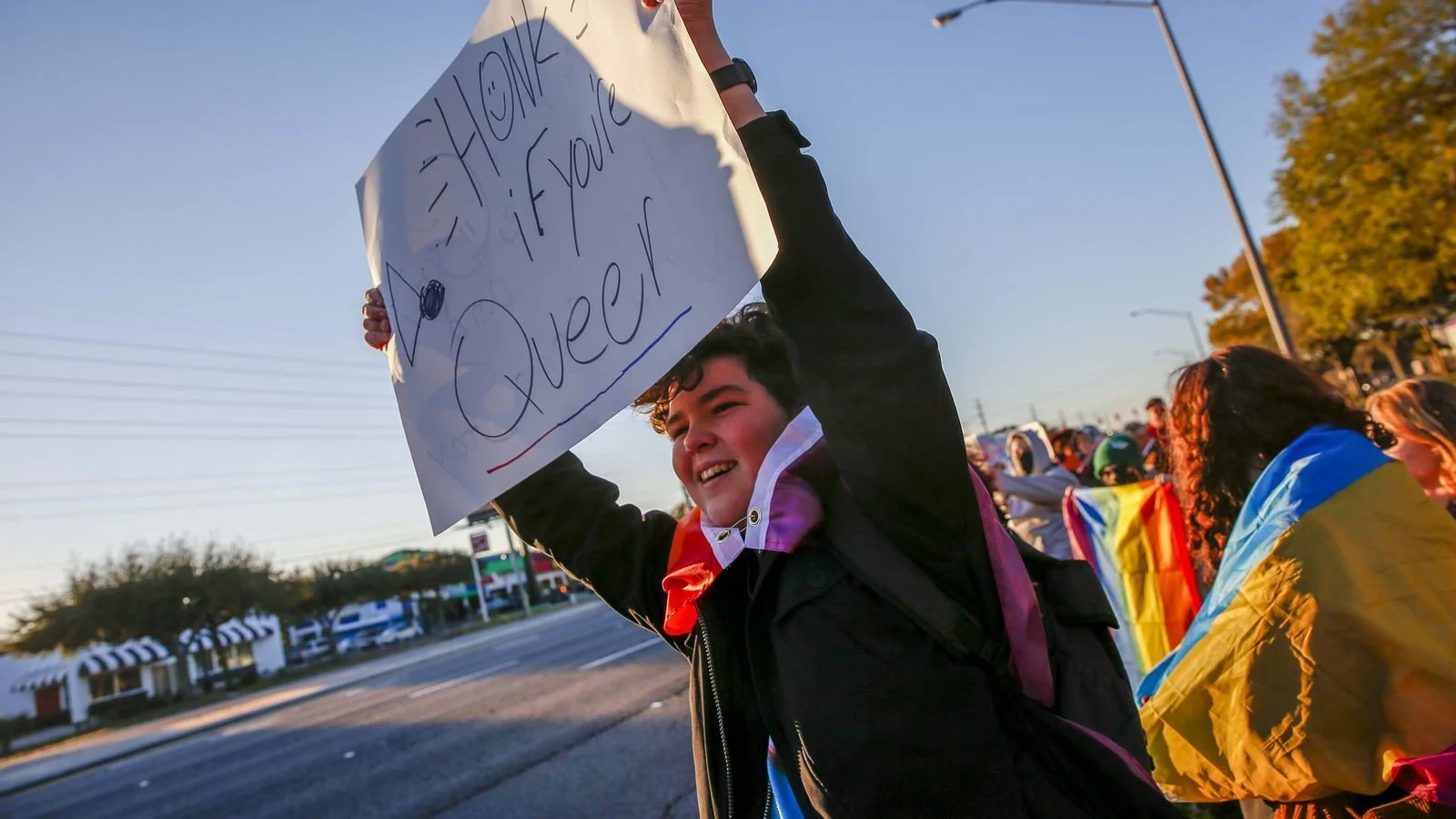OPINION: Florida senate ‘don’t say gay’ bill inspires national legislation, threatening LGBTQ youth
“Moses May, 14, leads a student protest Monday at Gaither High in Tampa against legislation that critics are calling the ‘don’t say gay’ bills…, February 2022.” Photo by Ivy Ceballo, Tampa Bay Times.
Julianna Rittenberg is a freshman studying political science and an opinion writer for The New Political.
Please note that these views and opinions do not reflect those of The New Political.
On Feb. 8, the Florida Senate Education Committee passed the Parental Rights in Education bill, nicknamed the “Don’t Say Gay” bill.
House Bill 1557 covers several anti-LGBTQ measures, including a ban on encouraging discussions regarding sexual orientation or gender identity in classrooms. It also includes a clause that may require educators to notify parents/guardians if there is a discussion related to the child’s well-being. The bill states in lines 51-56:
“The procedures must reinforce the fundamental right of parents to make decisions regarding the upbringing and control of their children by requiring school district personnel to encourage a student to discuss issues relating to his or her well-being with his or her parent or to seek permission to discuss or facilitate discussion of the issue with the parent.”
The term well-being is undefined in the bill and could be applied to sexuality or gender expression, especially if a child comes out to an educator and asks them not to tell their parents.
Also written into the bill is a section that gives parents and guardians the right to take legal action against educators who violate the bill. This section feels similar to the citizen enforcement section of the Texas six-week abortion ban, which allows citizens to take action against abortion providers, people who have abortion procedures and even Uber drivers or anyone who assists in the appointment.
The bill follows a record-breaking year of anti-LGBTQ laws according to the Human Rights Campaign. More than 250 anti-LGBTQ bills were introduced in 2021, and 17 were enacted. The “Don’t Say Gay” bill is sadly an addition to the long list.
The bill has gained national recognition, particularly by Chasten Buttigieg, who cited a Trevor Project study in a tweet stating that “42% of LGBTQ youth seriously attempted suicide last year.” The bill has been hailed by supporters for giving rights back to parents, but with suicide rates growing, a bill that forces kids into the closet and tells them they cannot be spoken of could do unthinkable harm.
In Ohio, LGBTQ bills are a mixed bag of support and repression. The Ohio Fairness Act has been introduced for its eleventh time in the Ohio General Assembly. The likelihood of its passing is not good, but its introduction raises awareness of the lack of discrimination protections for the LGBTQ community in Ohio. In July of 2021, Gov. Mike DeWine signed the Medical Conscience Clause, a law that allows physicians, hospitals, and insurers to refuse service to individuals who violate their moral or religious beliefs. This also includes payment of medical services that follow the same values. This law has been interpreted as anti-LGBTQ by the gay community and their allies.
Possibly the most infamous bill in Ohio at the moment is the transgender athlete ban. The ban, HB61, restricts what sports transgender students can play, according to whether they are transitioning male to female or female to male, as well as how far into their transition the student is. The ban barely takes into consideration the student’s gender identity, prioritizing the status of transition instead.
Stopping children from playing sports is isolating and contributes to negative mindsets. Perhaps related is the rise of harassment and bullying of transgender kids in schools across Ohio. Equality Ohio has reported a significant rise in phone calls from students, parents, teachers and counselors about harassment in schools since the pandemic. This is consistent with the United States Department of Education’s findings that 83% of LGBTQ kids had more issues during the pandemic that negatively affected their schoolwork, and 30% of LGBTQ kids felt their relationships with their peers declined compared to 19% of their straight peers.
Schools should be a safe space for LGBTQ kids, rather than another place that forces them to hide their authentic selves. If there is no space where kids can be themselves, especially in school buildings where they spend much of their time, we are teaching them that they should feel ashamed. Attacking the LGBTQ community in schools will only serve to alienate and destroy kids. It is time to move past forcing LGBTQ students back in the closet and accept that the community exists and is real. We need to start giving children real support systems.
For LGBTQ Bobcats at Ohio University, the LGBT Center, which has recently relocated to Baker Center room 348, serves as a resource and a place to exist in safety. The center offers a space to hang out and do homework, as well as programming and support groups to talk to other LGBTQ students at the university. More information on the center can be found on their Instagram page @ohiolgbtcenter.
Outside of Ohio U, the Trevor Project has created an online chat room, Trevor Space, to connect LGBTQ people ages 13-24 internationally, giving young adults and teens a place to connect with people who understand their experiences. The Trevor Project offers other resources, such as talking with mental health professionals and reading materials.

